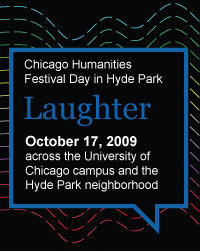| Sun | Mon | Tue | Wed | Thu | Fri | Sat |
|---|---|---|---|---|---|---|
| 1 | 2 | 3 | 4 | 5 | ||
| 6 | 7 | 8 | 9 | 10 | 11 | 12 |
| 13 | 14 | 15 | 16 | 17 | 18 | 19 |
| 20 | 21 | 22 | 23 | 24 | 25 | 26 |
| 27 | 28 | 29 | 30 | 31 |
CATEGORIES
RECENT ENTRIES
BLOG ROLL
Send in the clowns
Given the theme—laughter—of this year’s Chicago Humanities Festival, it seemed bold of the organizers to start the party on the U of C campus. Inviting a neuroscientist and a philosopher to give the opening lectures (and charging admission!) was equally audacious. As I scanned the crowd at Ida Noyes Hall last Saturday morning, the average age of audience members made me wonder if a giant fleet of Elderhostel buses had disembarked outside. Still, no one seemed the least bit worried about fun coming in to die.

Neurology professor Steven Small kicked off the festival with fair warning that he aimed “not to make you laugh, but to inform you about how laughter is mediated in the human brain.” He explained that laughter, “an exquisitely human phenomenon,” was also an anatomical reflex. Down the street in Fulton Recital Hall, philosopher Jonathan Lear dissected irony with the help of funny folks like Kierkegaard and Socrates. His goal was to explain irony’s basic structure and isolate what happens to us psychologically in the “ironic moment.”
Were there chuckles and appreciative nods? Sure. But no one really laughed out loud until the noontime session, “Deconstructing the Latke-Hamantash Debate,” in Mandel Hall. Following a brief history of the annual tradition, philosophy professor Ted Cohen emceed a mock version of the debate for the CHF audience. In full academic regalia, two presenters made their pitch. Opera expert Philip Gossett theorized about Verdi’s love of fruit pastries and showed how key passages in a newly analyzed manuscript of Rigoletto revealed the composer’s long passion for hamantaschen. Biologist James Shapiro (who showed his sense of humor with a 2007 journal article entitled “Bacteria are Small But Not Stupid” (pdf)) did a genomic analysis that proved the latke’s inferiority. The hamantash’s morphology, cortical development, and tasty “poppy-seed endoplasm” proved its intelligent design, Shapiro argued. Belly laughs followed.
Later in the day, audiences heard scholarly presentations on Molière’s comedic mission and the role of laughter in opera. The Chicago Humanities Festival—and the fun—will continue November 2–15 around the city.
Elizabeth Station
October 20, 2009
